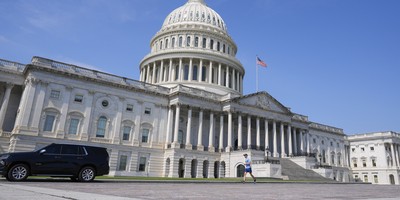He has not only been feted recently by White House advisors. He is all the rage at the Council on Foreign Relations, the International Monetary Fund, and the United Nations as well.
This 42 year economist from French academe has written a hot new book: Capital in the Twenty-First Century. A recent review describes him as the man “who exposed capitalism’s fatal flaw.”
So what is this flaw? Supposedly under capitalism the rich get steadily richer in relation to everyone else; inequality gets worse and worse. It is all baked into the cake, unavoidable.
To support this, Piketty offers some dubious and unsupported financial logic, but also what he calls “a spectacular graph” of historical data. What does the graph actually show?
The amount of U.S. income controlled by the top 10% of earners starts at about 40% in 1910, rises to about 50% before the Crash of 1929, falls thereafter, returns to about 40% in 1995, and thereafter again rises to about 50% before falling somewhat after the Crash of 2008.
Let’s think about what this really means. Relative income of the top 10% did not rise inexorably over this period. Instead it peaked at two times: just before the great crashes of 1929 and 2008. In other words, inequality rose during the great economic bubble eras and fell thereafter.
And what caused and characterized these bubble eras? They were principally caused by the U.S. Federal Reserve creating far too much new money and debt. They were characterized by an explosion of crony capitalism as some rich people exploited all the new money, both on Wall Street and through connections with the government in Washington.
Recommended
We can learn a great deal about crony capitalism by studying the period between the end of WW1 and the Great Depression and also the last twenty years, but we won’t learn much about capitalism. Crony capitalism is the opposite of capitalism. It is a perversion of markets, not the result of free prices and free markets.
One can see why the White House likes Piketty. He supports their narrative that government is the cure for inequality when in reality government has been the principal cause of growing inequality.
The White House and IMF also love Piketty’s proposal, not only for high income taxes, but also for substantial wealth taxes. The IMF in particular has been beating a drum for wealth taxes as a way to restore government finances around the world and also reduce economic inequality.
Expect to hear more and more about wealth taxes. Expect to hear that they will be a “one time” event that won’t be repeated, but that will actually help economic growth by reducing economic inequality.
This is all complete nonsense. Economic growth is produced when a society saves money and invests the savings wisely. It is not quantity of investment that matters most, but quality. Government is capable neither of saving nor investing, much less investing wisely.
Nor should anyone imagine that a wealth tax program would be a “one time” event. No tax is ever a one time event. Once established, it would not only persist; it would steadily grow over the years.
Piketty should also ask himself a question. What will happen when investors have to liquidate their stocks, bonds, real estate, or other assets in order to pay the wealth tax? How will markets absorb all the selling? Who will be the buyers? And how will it help economic growth for markets and asset values to collapse under the selling pressure?
If the Obama White House, the IMF, and people like Piketty would just let the economy alone, it could recover. As it is, they keep inventing new ways to destroy it.

























Join the conversation as a VIP Member